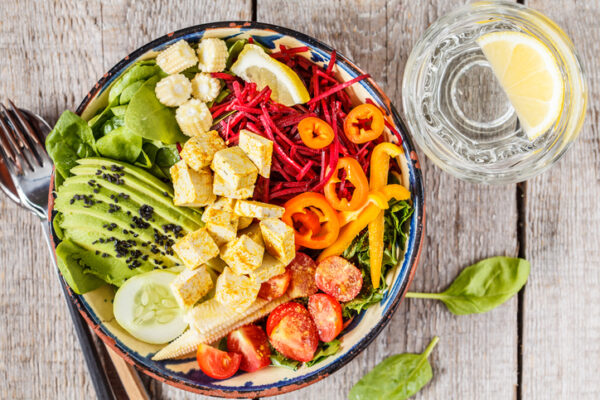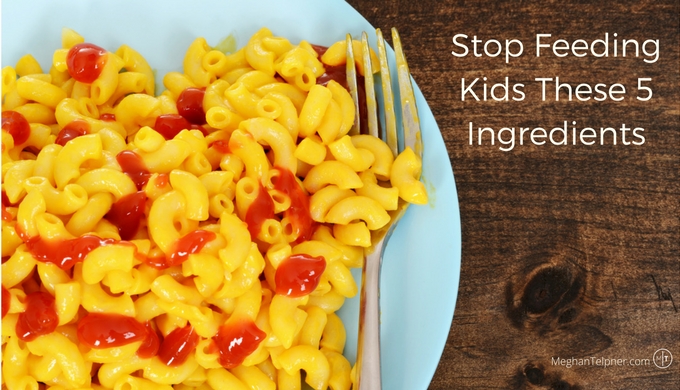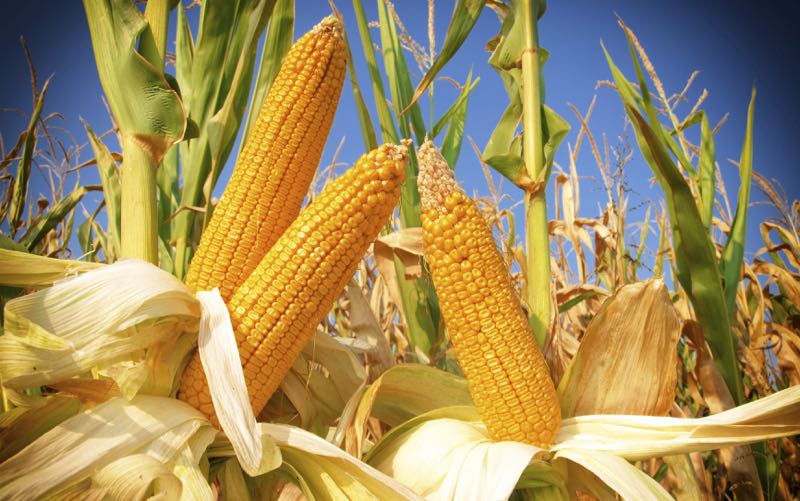20 Best Hormone Balancing Foods
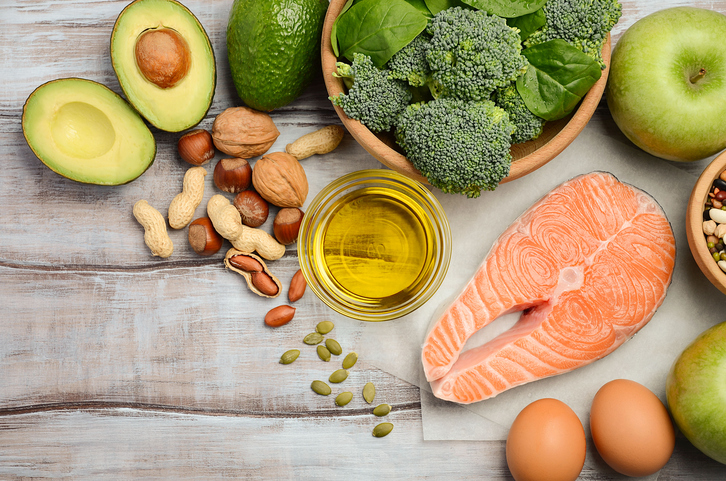
We make a wide variety of hormones that circulate throughout our bodies to help with growth, mood, sexual function and metabolism. It’s a complicated web that can be easily thrown off kilter, leading to symptoms that can disrupt our fertility, weight, menstrual cycles and our ability to cope with stress. Food is an incredibly helpful tool when dealing with hormone imbalances and today, we’re going to share our best hormone balancing foods with you.
Note that we cannot cover all of the hormones in the body and their unique effects, but we’re covering some of the most common hormone imbalances our grads from the Culinary Nutrition Expert program see in their clients.
How Do I Know If My Hormones Aren’t Balanced?
Before you include hormone-balancing foods into your diet, you need to know which ones are too high or too low. We recommend working with a health practitioner, who can help you assess your symptoms and determine which hormones need some fine tuning.
Get your FREE 3-Day Hormone Balancing Meal Plan plus 35 more free resource guides!
Fill out the form below for instant access.
Free Resource Library
Enjoy more than 40 downloadable guides, recipes, and resources.
Best Hormone Balancing Foods
Sex Hormones
What Are They: Our sex hormones manage our reproduction, the development of sex characteristics (eg breast and hips) and sexual motivation. Some of the main hormones are estrogen, progesterone and testosterone.
How Do They Get Out of Whack? Our sex hormone levels can change naturally during different stages of life (eg puberty or menopause), but they can also be thrown out of balance by diet, lifestyle and our exposure to toxins.
Best Sex Hormone Balancing Foods
Flax Seeds
Flax seeds are rich in anti-inflammatory omega-3 fats and contain phytoestrogens, which are plant-based compounds that mimic estrogen, bind to our estrogen receptors and help us excrete excess estrogen from the body. They can also help improve or prevent additional hormone-related issues including breast cancer, menopausal symptoms and osteoporosis.
Wild Salmon
Salmon is an excellent source of Vitamin D, a fat-soluble vitamin that helps us make our sex hormones. and boost testosterone levels. Vitamin D is important for bone health and immunity, too. Salmon is also high in omega-3 fatty acids, which have been shown to reduce our risk of breast cancer and prostate cancer.
Organic Tempeh
Soy is a controversial topic for many reasons, including genetic modification and allergies, but when you choose good sources like organic miso and tempeh you can garner the positive benefits of soy’s isflavones, which have phytoestrogenic properties and can reduce the risk of breast cancer. The source of soy is definitely important – and a fermented choice like tempeh or miso will bring you the beneficial probiotics that improve digestion and mood. Balanced digestive flora also reduces the activity of an enzyme called beta-glucaronidase, which is linked to estrogen-related cancers.
Broccoli
Broccoli is a member of the cruciferous family of vegetables (which also includes cauliflower, kale, cabbage and Brussels sprouts). Crucifers are rich in glucosinolates, which are sulphur compounds that help to neutralize and eliminate carcinogens, as well as isothiocyanates and indole-3-carbinol (I3C) – important nutrients that prevents estrogen-related cancers. Broccoli is also high in fibre, which helps us eliminate excess estrogen through our bowel movements.
Lentils
These little gems are a great source of protein and fibre, which can reduce estrogen levels. Lentils (and sunflower seeds below) contain zinc too, which raises testosterone.
Sunflower Seeds
These are high in Vitamin E, an antioxidant that is important in estrogen production and may reduce breast cancer risk. It also helps to boost progesterone.
Sweet Potatoes
Love these tubers already? Now you have another reason – they are high in Vitamin B6, a vitamin that helps with liver detoxification. Other foods rich in Vitamin B 6 include spinach, turkey and chicken. Any food that aids with liver detox is going to also help rid us of any excess hormones. You can read up on more detoxifying foods here.
Thyroid Hormones
What Are They: Thyroid hormones are responsible for energy and metabolism. They include T3, T4 and calcitonin. TSH, which is produced in the pituitary, helps to regulate the thyroid.
How Do They Get Out of Whack? Iodine deficiency, an inability to produce the proper amount of thyroid hormones, autoimmunity when the body attacks thyroid tissue, a growth in the thyroid.
Best Thyroid Hormone Balancing Foods
Seaweed
Sea vegetables (nori, wakame, dulse, arame, kombu, hikiji, etc.) are amazing sources of iodine, an important mineral that helps us manufacture our thyroid hormones.
Brazil Nuts
Brazil nuts are packed with selenium, an antioxidant that protects the thyroid gland and helps the body convert T4 into T3, the active form of the thyroid hormone. Having just a couple of Brazil nuts each day is enough to meet your selenium needs and they taste delicious, so this is very easy to do!
Sardines
People with an underactive thyroid tend to have low levels of B12, and sardines are a great source of this important nutrient. Sardines also contain a good amount of selenium and a small quantity of iodine, so they are an overall thyroid-supportive food.
Spinach
Iron-rich foods like spinach help to enhance thyroid function and aid the production of thyroid hormones. Its iron content, as well as the range of B vitamins, can also offer an energy boost to those who are feeling sluggish and tired.
Quinoa
Quinoa is definitely a superfood, with a broad spectrum of minerals, protein and fibre. A slow thyroid can also slow down digestion, leading to constipation. Quinoa’s high fibre content can get the bowels moving, and it’s a good source of zinc, another mineral that assists us with thyroid hormone production.
Adrenal Hormones
What Are They: The adrenal glands sit atop the kidneys. They are responsible for helping us manage stress, regulating our blood sugar and blood pressure, and help us produce sex hormones. Adrenal hormones include cortisol, adrenaline, DHEA, aldosterone and norephinephrine.
How Do They Get Out of Whack? Chronic physical and emotional stress, lack of sleep, poor diet (including excessive sugar, which sets off blood sugar imbalance)
Best Adrenal Hormone Balancing Foods
Bell Peppers
These sweet peppers give us a boost of Vitamin C, an antioxidant vitamin that is essential to the function of the adrenal glands. We store a load of Vitamin C in our adrenals and when we are stressed, we use up a lot of it. Vitamin C-rich foods like bell peppers offer us replenishment, along with a spate of B vitamins that will offer us energy and help us reduce stress levels.
Kale
Dark leafy greens such as kale provide a wide spectrum of nutrients, in particular the antioxidant Vitamins K, A and C. Similar to bell peppers, kale’s Vitamin C will help shore up our adrenals and its B vitamins will nourish our nervous systems. These antioxidants also help to combat the damage caused by stress.
Avocado
Blood sugar imbalances can disrupt our adrenal hormones. Sugary foods in particular will affect our blood sugar levels. Avocados are a rich source of healthy fats that will help keep our blood sugar levels even, and will support our nervous system function. They also contain Vitamin B5, otherwise known as pantothenic acid, a stress-fighting B vitamin that helps us handle stress.
Almonds
These are another nutritious fat that will help to balance blood sugar levels , aid the nervous system and combat inflammation.
Pumpkin Seeds
Pumpkin seeds are a source of magnesium. When we are stressed, we can deplete our magnesium levels. Magnesium is our anti-stress mineral that works alongside Vitamin C and Vitamin B5 to support the adrenal glands and lower stress levels. In short, magnesium-rich foods like pumpkin seeds can help us relax!
Eggs
Reach for eggs to grab a dose of choline, a vitamin that helps us produce the neurotransmitter acetylcholine, which is essential to the nervous system, brain health, memory and development. They also contain omega 3 fatty acids, the anti-inflammatory fats that support the brain. When our minds and nervous systems are healthy, we are better able to cope with stress. Aim to buy organic, pasture-raised eggs instead of conventional.
Millet
Millet is a gluten-free whole grain that contains a wide spectrum of B vitamins that will support our nerves and brains in times of stress. It also contains magnesium and fibre, which contributes to balanced blood sugar.
Sea Salt
Aldosterone, one of our adrenal hormones, is responsible for fluid balance and blood pressure. If our adrenals aren’t functioning well and aldosterone levels fall, we can secrete more sodium, leading to salt cravings. A good dash of sea salt to your food or even a glass of water will help to replenish sodium levels and offer trace minerals. You can also try seaweeds or miso for their salt content.
Our hormones are a complicated business and it’s important to work with a qualified health practitioner to ensure you are able to properly correct any imbalances. Once you know which hormones are out of whack, you can use hormone-balancing foods to bring your health into harmony.
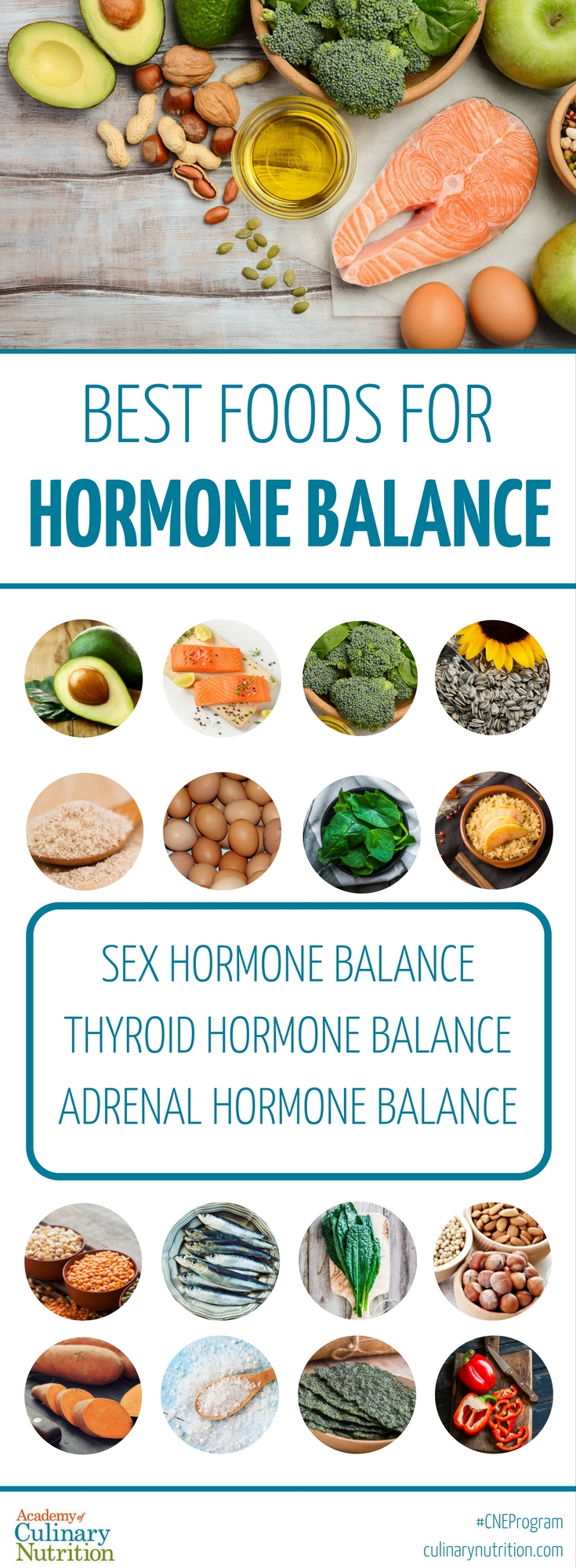
Free Resource Library
Enjoy more than 40 downloadable guides, recipes, and resources.


















